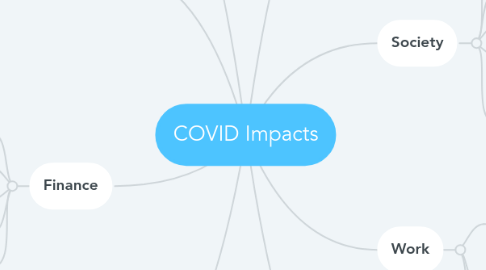
1. Digitalisation
1.1. Some pre-Covid trends are reinforced by the pandemic.
1.2. Leapfrogged 5 to 10 years in a matter of months.
2. Economics
2.1. National self-interests.
2.2. Weaknesses of interdependence.
2.2.1. Questioning of globalisation.
2.2.2. Supply chains fragility.
2.3. Addiction to artificial financial support.
2.4. Uneven economic recovery.
2.4.1. Between countries.
2.4.2. Between industries.
2.5. International corporations taxation.
3. Finance
3.1. Debt Service Suspension Initiative
3.2. Never-seen-before money injections.
3.3. Extraordinary actions from central banks.
3.4. Addiction to 'easy-money'.
3.5. Potential for inflation.
4. Climate
4.1. Increased awareness to global issues.
4.2. Increased financial support to priority issues.
4.3. Impact on energy transition.
4.3.1. Key learning: 'it is possible, whatever it takes'.
4.3.2. Less productive companies do not survive.
4.3.3. Different energy demand between domestic, commercial and transport sectors.
4.4. Effectiveness of international institutions.
5. Health
5.1. New health system models needed.
5.2. Huge backlog created by Covid prioritisation.
5.3. Mental health issues.
5.4. WHO's effectiveness is questioned.
5.5. Challenge of vaccines for all.
5.5.1. Ensuring vaccines for poorest nations.
5.5.2. Right level of encouragement for pharmaceutical companies.
6. Society
6.1. Increased unemployment.
6.1.1. Youth unemployment.
6.2. Education disruption.
6.3. Lack of social interactions.
6.4. Poverty.
6.4.1. Increasing gap between rich and poor.
6.5. Long-term social consequences.
6.5.1. Potential for a lost generation.
6.5.2. Care for the elderly.
6.5.3. Better work-life balance.
7. Work
7.1. Nature of work changed dramatically.
7.1.1. Home working more common.
7.1.2. Hiring without boundaries.
7.2. Major implications for commercial spaces and transport.
7.3. Travel sector hugely impacted.
8. Politics
8.1. Erosion of trust in governments.
8.2. Culture of caution.
8.2.1. Reliance on expert views.
8.2.2. Legal protections.
8.3. Populism
8.3.1. Consolidation without oversight.
8.4. Lack of scrutiny
8.4.1. Restriction of liberty.
8.4.2. Economic orthodoxy.
